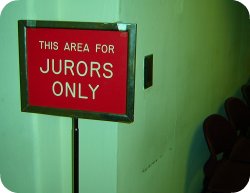People v. Carmichael, — N.Y.S.2d —, 2009 WL 5126920, (N.Y.A.D. 4 Dept., Dec 30, 2009)
A recent decision from a New York appellate court gives us occasion to think about the problem of jurors doing web research to find information relating to the case.
The Carmichael Case
A jury convicted one Carmichael of murder. One of the jurors did some internet research during the trial on the question of whether the gunshot wound on the victim was a close contact wound or was inflicted from a distance. When Carmichael discovered the juror’s research, he moved to set aside the jury’s verdict. He argued that the juror’s misconduct caused prejudice to a substantial right.

The trial court denied the motion and Carmichael sought review. On appeal, the court held that the trial court properly denied the motion to set aside the verdict.
It found that Carmichael suffered no prejudice to a substantial right because the juror’s testimony at a hearing on the matter showed that the information found during the internet research was not helpful, that he remained confused even after the research, and that he based his verdict only on the evidence presented at trial.
The Modern Person’s Connection to the Web
The sense of connection that the modern person feels within the web causes an intriguing disruption to the traditional method of the jury trial system. It calls us to evaluate whether it’s fair to characterize conduct like that of the Carmichael juror as “misconduct.” As this Time article notes (and as we all know from our own experiences), it is natural for jurors to desire background, contextual information about the matter being considered.
The tension applies to the problem of jurors acquiring information concerning the case as well as the problem of jurors distributing information they have, or making inappropriate connections with others in the process. The past few months have shown us, for example, stories of improper attempts by jurors to friend witnesses, prohibitions on judges connecting with lawyers, questions of witness intimidation through Facebook, and orders prohibiting courtroom tweeting.
In most instances this tendency to want and share information is a positive attribute. Skepticism, rationality and transparency are noble qualities. But information crossing the abstract borders of the trial court can jeopardize the fairness that the process has historically ensured. It’s no small problem. Even Britain’s Lord Chief Justice recognizes that the ability to so easily get information external to the case “changes the whole orality tradition [i.e., oral testimony] with which we are familiar.”
It’s not a new problem. I was writing about it almost five years ago. Here’s a post I wrote and a podcast episode I did about it back in 2005.
Keep ’em Clamped Down
At the most general level there are two options for handling the present tension. Courts could assimilate the modern tendency and simply leave the process unchecked — allowing information to flow in and out as if on the breeze. The other option would be to clamp down, as the courts in Michigan have done, enacting rules that prohibit jurors doing research and disseminating information during the proceedings.
Our tradition should tell us to go with the latter, that is, clamping down. Looking at it a certain way, there is nothing different in kind occasioned by modern communication methods that mandates information to be free flowing. Though in the past it would have been less feasible, it would not have been impossible for jurors to share information during the process or do external research during off hours. To foster the fairness of the proceedings, courts have historically fortified the abstract walls of the courtroom, permitting the jurors only to consider the evidence made a part of the record. Think about it — that’s the entire basis for having rules of evidence in the first place.
So even though it’s easier to get information these days, and even though jurors want to do that (and in most situations outside of jury duty should be encouraged to do so), there is no good reason not to enforce strict regulations prohibiting outside research. Whether a juror should be permitted to share information during the process is more subtle — there are more concerns there about openness in the process implicated. Absent national security or other similar reasons, we generally don’t want proceedings to be incommunicado.
The solution should not be an assimilation and accompanying dissolving of the borders of the walls around the process, but should come from education of the jury pool. The quasi-closed system of the proceedings, moderated by rules of evidence helps ensure fairness and accuracy. To the extent jurors are helped to understand such a notion of “information regularity,” the more likely they are to see that it makes good sense.
Jurors only photo courtesy Flickr user dmuth under this Creative Commons license.
